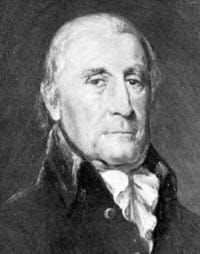Francis Lewis (March 21, 1713 - December 31, 1802) was a delegate from New York during the Second Continental Congress. He ventured into politics after the French and Indian War.

He became a signer of the Declaration of Independence and sacrificed all on the altar of patriotism. He served alongside fellow New York delegates: William Floyd, Lewis Morris, and Philip Livingston.
Lewis was born in Wales to his father of the same name. His father died at a young age, and he was then raised by his uncle and aunt. They gave him an education in Scotland and sent him to the Westminster School in England.
He emigrated to New York in 1734. He would serve as a British mercantile agent and be taken prisoner by the French in 1756 during the French and Indian War.
When he returned to America, he became involved in American politics and served as a member of the Committee of Sixty, New York Provincial Congress, and then elected to the Continental Congress. He would be a signer of the Declaration of Independence and the Articles of Confederation.
However, the American Revolutionary War would bring its share of problems to Francis Lewis. His wife was captured by the British and was treated harshly. She was denied a bed, a change of clothes, and sufficient food for weeks while a prisoner.
The British were notorious for their mistreatment of prisoners, but Mrs. Lewis felt it especially hard since her husband had signed the Declaration of Independence and was deemed a traitor. George Washington was able to get his wife returned in exchange, but the abuse she had taken never left her, and she never returned to a sound mind. She died a couple of years later.
The British also ransacked his house on Long Island and effectively destroyed the wealth that he had acquired. He would never regain his fortune.
Francis Lewis did have a son, Morgan Lewis, who served in the Continental Army. Morgan Lewis continued in his father's footsteps and ventured into politics. He would eventually become the governor of New York.
Francis Lewis died at the age of 90. Charles Goodrich had this to say about him:
Of the subsequent life of Mr. Lewis, we have little to record. His latter days were spent in comparative poverty, his independent fortune having in a great measure been sacrificed on the altar of patriotism during his country's struggle for independence. The life of this excellent man and distinguished patriot was extended to his ninetieth year. His death occurred on the 30th day of December 1803.
